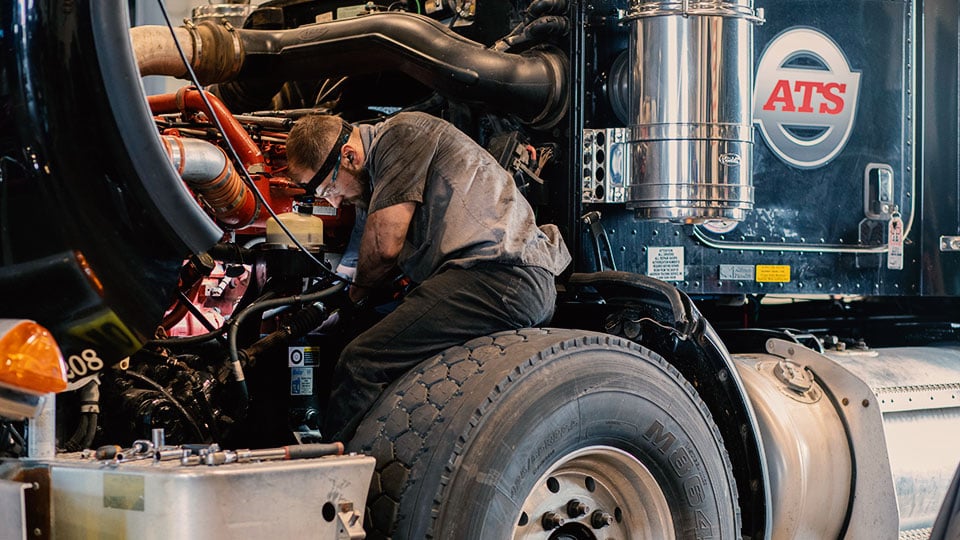
- Diesel mechanic definition
- Diesel mechanic job description and duties
- Required education and experience
- Advantages of becoming a diesel mechanic
- Challenges in a diesel mechanic career
- Diesel mechanic salary range
- How to know if a mechanic position is right for you
Diesel mechanics are an essential cog (some pun intended) in the trucking industry. Their work keeps their company’s fleet of class-8 semi trucks running efficiently — and it's a challenging, fast-paced and rewarding job that many enjoy.
By and large, diesel mechanics don’t have any trouble finding employment within the transportation realm; thousands of companies (fleets and dealerships) hire diesel mechanics every year (some even help with training and tool purchases). So if you’re motivated to find your place as a diesel mechanic, you won’t need to look too far.
Additionally, diesel mechanics can make a respectable living, earning a competitive hourly wage and overtime pay in many cases. That said, there are also a few downsides to working as a mechanic. You’ll want to consider them before you apply for a position or pursue education in this realm.
Here at Anderson Trucking Service (ATS), our mechanics (spread across a variety of maintenance locations) work on our more than 1,000 trucks every year. As a growing company, we’re constantly looking to bring on new mechanics — adding them to our well-trained ranks across the U.S.
Deciding on the next step in your career journey isn’t easy, especially with so many options. That’s why this article will explain everything you need to know about working as a diesel mechanic in the transportation industry (an industry with pros and cons of its own).
What is a Diesel Mechanic?
A diesel mechanic, also commonly called a diesel technician, is a trained professional who specializes in repairing, maintaining and servicing diesel engines and diesel-powered vehicles. This includes conducting repairs and maintenance on all components of diesel-power equipment including their engines, drivelines and electrical systems.
Diesel engines are commonly used in heavy-duty equipment, such as semi-trucks, buses, construction vehicles and agricultural machinery. These engines operate at higher internal cylinder temperatures (due to a higher compression ratio) than their gasoline counterparts, making them more durable and efficient.
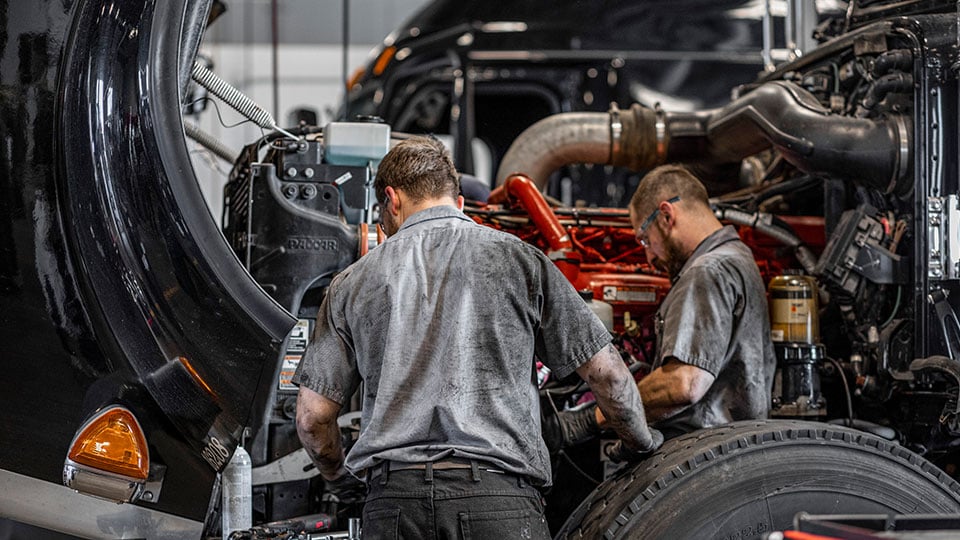
Mechanics are responsible for diagnosing and repairing various problems that can occur in diesel machinery. They use a variety of tools and equipment to test and diagnose issues with engines and other systems, including computer diagnostic equipment, multimeters and pressure gauges. Diesel mechanics may also work with specialized tools, like those specific to each manufacturer, to perform more complex repairs.
In addition to repairing vehicles, diesel mechanics also perform routine maintenance to prevent problems from occurring in the first place. This can include tasks such as changing oil and filters, inspecting belts and hoses and checking fluid levels. In trucking specifically, many mechanics conduct safety inspections on diesel-powered vehicles to ensure they are safe to operate on the road.
What Are the Duties of a Diesel Mechanic?
A diesel mechanic’s duties can vary depending on the employer they work for, the equipment they work on and the industry they occupy. However, four common duties most diesel mechanics can expect to perform include:
- Diagnosing and repairing diesel engines: Diesel mechanics must be able to troubleshoot and identify issues with diesel engines, including problems with fuel injection systems, emissions systems and electrical systems. Mechanics use a variety of tools and diagnostic equipment to determine the root cause of the problem and then work to repair or replace any faulty components.
- Conducting routine maintenance: Diesel vehicles require regular maintenance to operate at peak performance. Diesel mechanics are responsible for performing these routine maintenance tasks.
- Performing safety inspections: Diesel-powered vehicles (particularly semi-trucks) must be inspected periodically to ensure they are safe to operate. Diesel mechanics are responsible for conducting safety inspections, which may include checking brakes, steering and suspension systems, as well as inspecting lights, tires and other safety features.
- Keeping records: Together with their teams, diesel mechanics are responsible for maintaining detailed records of all work performed on diesel equipment, including repairs, maintenance and safety inspections. This information is used to track the history of the vehicle and to identify any recurring issues that may require further attention.
This is, of course, not a comprehensive list. Overall, in the trucking industry, diesel mechanics play a critical role in ensuring the safe and efficient operation of their company’s trucks.
What Education and Experience Do Diesel Mechanics Need?
To become a diesel mechanic, one typically needs a high school diploma or equivalent (although sometimes you don’t). Some employers may also prefer or require post-secondary education, such as a certificate, diploma or degree in diesel technology or a related field. These programs give mechanics a solid foundation in the construction of diesel engines and offer a hands-on introduction to working with diesel-powered equipment.
Besides formal education, most companies require diesel mechanics to have robust experience before allowing them to work on engines directly. Many begin their careers as apprentices or helpers, working alongside experienced mechanics to learn the trade.
Starting out as a mechanic, you’ll spend most of your time working on each vehicle’s chassis systems and other components, rather than on the engines themselves.
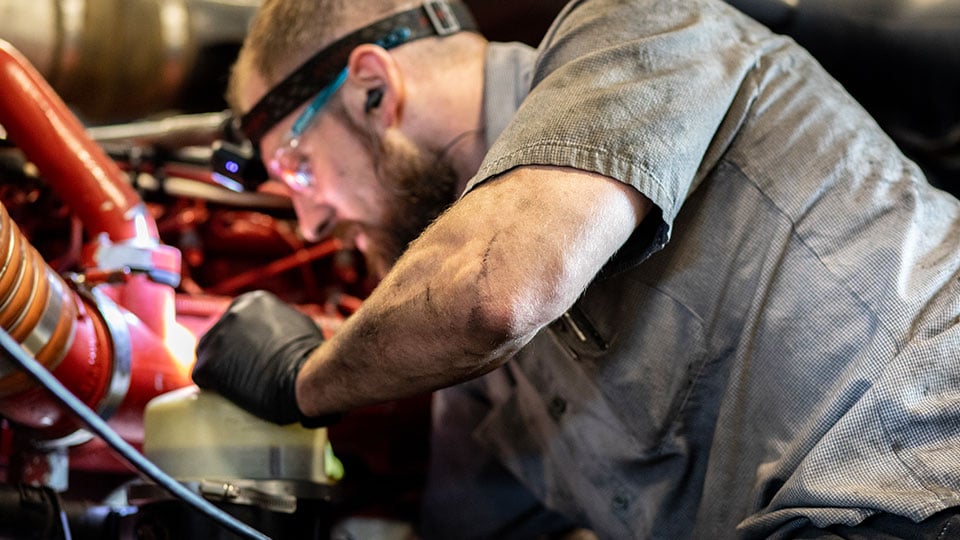
On-the-job training is also often offered. This can provide valuable experience working with a variety of diesel engines, components and equipment, as well as exposure to different types of repair and maintenance tasks.
Mechanics also benefit from staying up-to-date with the latest advancements in diesel technology. This can include attending training sessions or workshops offered by manufacturers, as well as reading industry publications and participating in professional organizations.
Some employers may require diesel technicians to obtain specialized certifications from organizations such as the Department of Transportation (DOT) — this is required to audit and inspect commercial motor vehicles. The National Institute for Automotive Service Excellence (ASE) is another common certification mechanics obtain.
A combination of education, on-the-job training and ongoing professional development is essential for diesel mechanics to develop the knowledge and skills needed to succeed in this field.
Employers typically look for candidates with a strong work ethic, attention to detail and a commitment to safety and quality workmanship.
Related: What Certifications Do I Need as a Diesel Technician?
What’s Great About Being a Diesel Mechanic?
From this point on, we’ll talk mostly about being a diesel mechanic in the trucking industry — that’s where our experience lies. Mechanics are, quite honestly, one of the most important pieces of the transportation world.
You see, “downtime” (trucks sitting idle, usually at a maintenance facility) leaves a major impact on the lives of truck drivers (impacting how much money they make and their job satisfaction). This, in turn, impacts their larger trucking company — efficiency is key to turning a profit and building strong customer relationships.
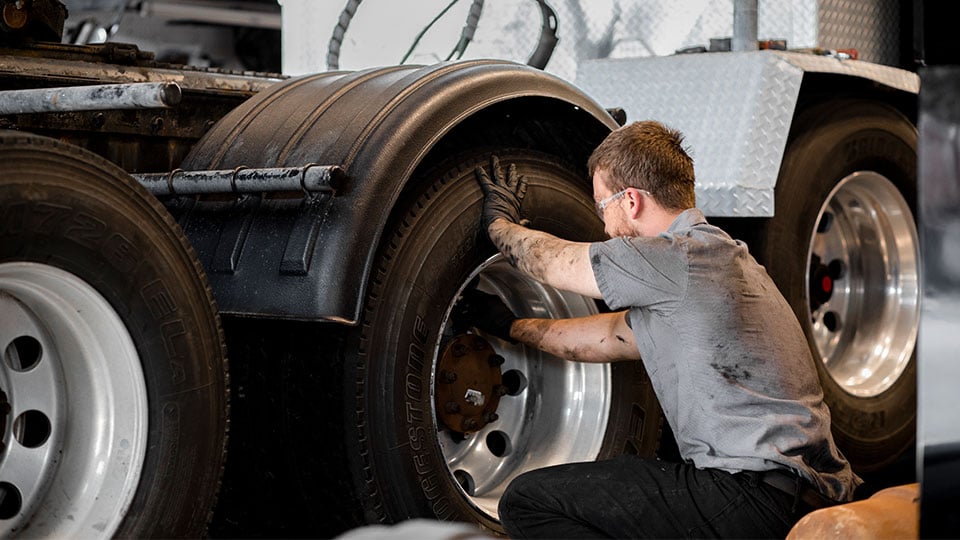
Diesel mechanics are a central piece of this process, making it a really rewarding job. Going home each night knowing your work that day helped drivers, your company and its customers meet their goals is fulfilling.
On a larger scale, the trucking industry touches all others; practically every single product is moved by semi-truck at least once. As a diesel mechanic, the impact of your work is evident as it directly influences our national economy.
What’s Challenging About Being a Diesel Mechanic?
Every job has a rub or two. This could be your boss, the kind of activities you do or the hours you work. For office workers, this might be the time they spend behind a desk, creating an unhealthy, sedentary lifestyle.
Maintenance positions, which are considered “blue collar,” feature a different set of downsides — some of which apply to working as a mechanic in the trucking industry. Before you pursue a role as a diesel technician, you will want to account for these challenges. . .
First, mechanic work is dirty. It might seem obvious, but it’s difficult to stay clean when you’re working in a shop on class-8 semi-tractors all day. So, if you’re hoping for a job that leaves you squeaky clean at the end of the day, this isn’t the career for you.
Next, being a mechanic can be hard on the body. This role requires a lot of bending over, regularly lifting heavy objects and putting your body in “awkward” positions. Performing maintenance, tests and inspections will require some physicality — make sure you’re up for it before you pursue this role.
The final challenge of this job is perhaps most important to note: Working as a mechanic can feel like a high-pressure job at times — especially in trucking. There are a lot of people depending on you to perform your duties as a mechanic and to get that machinery up and running again. For this reason, it’s not unreasonable for a diesel mechanic to feel overwhelmed by their work and stressed out when it piles up.
While most companies have teams and leadership systems in place to assist their mechanics, the pressures of this role are often overlooked.
How Much Does a Diesel Mechanic Make?
Diesel mechanics make pretty good money, even at the start of their careers. It’s not uncommon for a new mechanic to start out making around $22 per hour. Of course, this depends on their experience, background, location and industry. Without any formal education or training, an entry-level mechanic might make less. A mechanic who has participated in training, schooling or job shadowing, could make more.
As non-exempt employees, diesel mechanics are also often offered overtime pay at a rate of 1.5 times their hourly wage. It’s also common for some companies to give their technicians a monthly incentive based on the number of jobs they complete or how productive they are during the month.
Related: Diesel Mechanic Pay Structures: How Mechanics Get Paid
Who is a Mechanic Job Good For?
Mechanic positions are great for go-getters who are interested in engines, machines, parts and equipment. Since it’s pretty hard work, individuals with strong work ethics typically do best.
Additionally, if you’re looking for a job where you can make a large, measurable impact on your organization and feel fulfilled every day, this could be a good career path for you. Diesel mechanics constantly face new challenges and learn new techniques for executing their functions, which is also exciting.
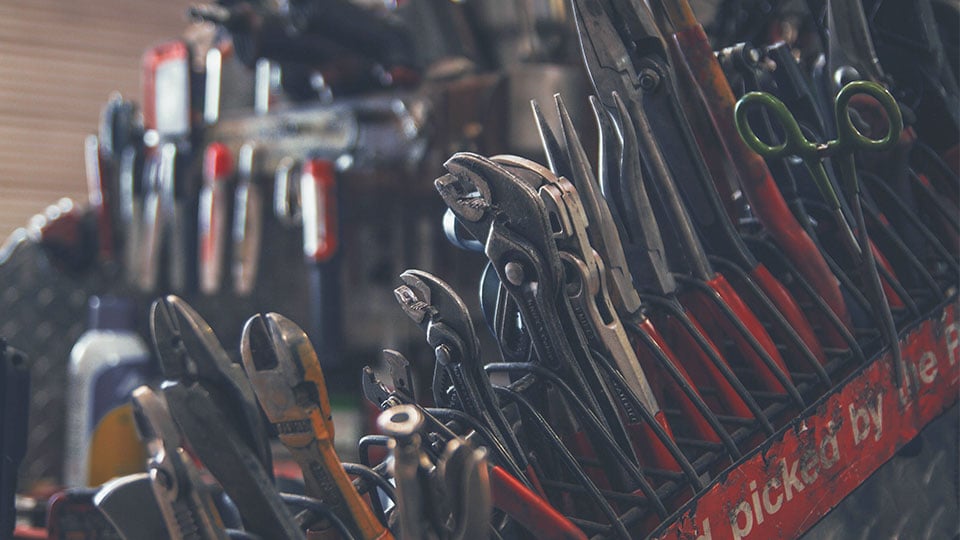
Here are 6 Skills You Need to Be Successful as a Diesel Mechanic
Now you’re more familiar with what it means to be a diesel mechanic. This role certainly isn’t for everyone, but many people love being mechanics — and earn a great living doing so.
If you’re interested in pursuing this career, don’t stop here. Your next step is to begin filling your resume with experiences and training to round out your knowledge of this trade.
Also, being successful as a mechanic takes hard work, determination and a commitment to constantly learning new things. These are some of the most attractive qualities employers look for when hiring mechanics, but there are a few more. . .
Read "How to Be Successful as a Diesel Mechanic: The 6 Skills You Need" to see what skills you possess and where you might need a bit more work.
Finally, if you’d like to learn more about what working as a diesel mechanic at ATS could look like, check out our open positions page here. We have many hiring locations. If you have any questions, don’t hesitate to reach out. We’re happy to help you on your career journey in any way you need.


